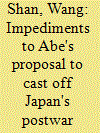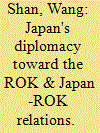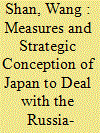| Srl | Item |
| 1 |
ID:
152184


|
|
|
|
|
| Summary/Abstract |
Nationalism threatens to imbue modern Japan with a rationale for increased militarism. Post-war nationalism was a reason Japan had launched war abroad, but the reinvigoration of Japanese nationalism is burgeoning under two-term Prime Minister Shinzo Abe. His sense of nationalism, which has domestic and international repercussions, has developed under the influence of his family political genes. Abe’s nationalism is being carried out in internal and external policies, with increasingly negative impact on domestic and regional order. The international community should remain vigilant of his right-wing politics.
|
|
|
|
|
|
|
|
|
|
|
|
|
|
|
|
| 2 |
ID:
136333


|
|
|
|
|
| Summary/Abstract |
The idea of pacifism dates back to the comprehensive social reforms that were introduced after Japan’s surrender in World War II. The U.S.-led occupying forces carried out a series of democratization and demilitarization policies in a bid to establish a government that would respect other countries and embrace the UN Charter. The U.S. wanted a Japan that would no longer pose a threat to them and to international peace and security. Those policies soon led to a breakdown of Japan’s old systems. In contrast to militarism during the pre-war period, Japan’s U.S.-led social reforms were peaceful. With the gradual evolution of policy adjustments, Japan gradually achieved rapid economic growth and regained recognition from the international community. It apologized for its war-time aggression. Pacifism was widely accepted by the Japanese people and it laid a foundation for Japan’s peaceful development. And so pacifism became part of the Japanese society’s system of values.
|
|
|
|
|
|
|
|
|
|
|
|
|
|
|
|
| 3 |
ID:
130612


|
|
|
|
|
| Publication |
2014.
|
| Summary/Abstract |
A fundamental change in Japanese politics means that neo-conservatives now are meeting fewer obstacles. The wide margin enjoyed by the Liberal Democratic Party led by Shinzo Abe in Japan' s July 2013 election for the upper house (House of Councillors) was a second resounding victory for the LDP, which had won in the lower house (House of Representatives) at the end of 2012. Whether or not the LDP can assume the long-term reins of government, the party will have a comparatively steady lock on the Japanese political arena in the short term. The so-called "twisted Diet" or "distorted" two-house system that has existed since 2007 will be nonexistent. Abe' s open intention to "cast off the postwar system" translates into a dynamic turn toward increased nationalism, militarism, and domestic repression as the answer to economic stagnation.
Neo-conservatives, led by Abe, seek to convince constituents that economic revival depends on discarding an outdated constitution and creating new rules that favor Japan ' s military might
|
|
|
|
|
|
|
|
|
|
|
|
|
|
|
|
| 4 |
ID:
054597


|
|
|
| 5 |
ID:
067849


|
|
|
| 6 |
ID:
190192


|
|
|